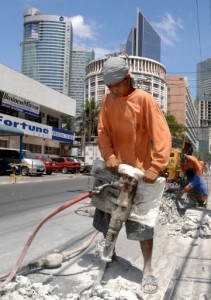Foreign investments down 60% in Sept.

A laborer works on a road project in Makati City in this file photo. Economists said that outstanding domestic problems related to insufficient infrastructure, among others, adversely impact on the ability of the Philippines to attract foreign direct investments, which suffered a big drop in September 2012. AFP PHOTO/Jay DIRECTO
The Philippines suffered a big drop in foreign direct investments (FDIs) in September in what officials claimed was due to global economic problems.
The decline was also attributed to lingering issues adversely affecting the business climate in the country. Economists said a growing economy alone would not be sufficient to generate a higher amount of FDIs, noting the need for efforts to solve structural issues that discouraged more foreigners from doing business in the country.
The Bangko Sentral ng Pilipinas reported Monday that the net inflow of FDIs amounted to only $55 million in September, down 60 percent from $138 million in the same month last year.
Gross inflow amounted to $100 million, falling by 41 percent from $170 million from a year ago, while total outflow during the month amounted to $45 million.
Sectors that benefited the most from the gross inflow in FDIs during the month were wholesale and retail trade, real estate, transportation, and storage and manufacturing.
Article continues after this advertisementFor the first three quarters of 2012, however, the net inflow of FDIs was up 40 percent at $1.09 billion from $782 million in the same period last year.
Article continues after this advertisementGovernment economic officials said the prolonged crisis in Europe was causing volatility in risk appetite among foreign businesses, eventually leading to a drop in FDIs in September.
But economists said that outstanding domestic problems related to insufficient infrastructure, the tedious process in setting up a business, restrictions on foreign ownership and high power cost adversely impact on the ability of the Philippines to attract FDIs.
Although there was risk aversion globally, they said the ability of neighboring countries to attract investments was less affected than that of the Philippines.
“There is also a local component affecting the drop in FDIs. There are still issues that remain hanging in the balance,” economist Victor Abola of the University of Asia and the Pacific told the Inquirer.
He said the implementation of infrastructure projects lined up under the public-private partnership (PPP) program must be hastened and that investments in power plants should increase to address problems on insufficient infrastructure and high electricity cost.
“There is no room for complacency. A lot of work still has to be done to attract more investors and create jobs,” Abola said.